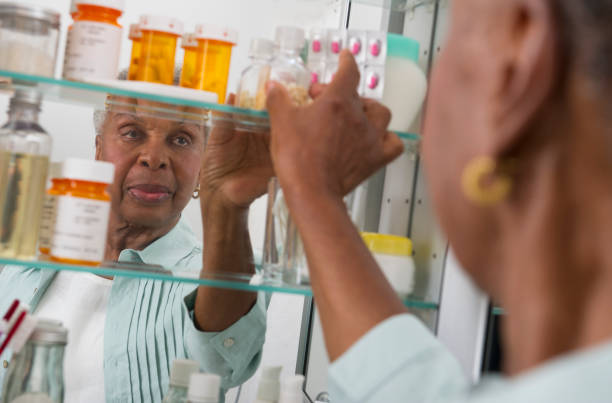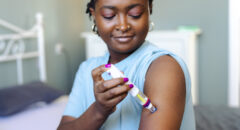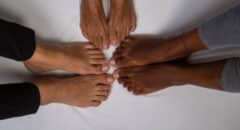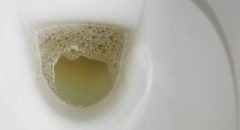
Oxygen, light, and water are among the substances that humans need to survive. However, those same life-affirming elements can be destructive if they're present where many people keep their medications, according to the U.S. Food and Drug Administration.
Take a look in your medicine chest. What's there may trigger a nostalgic swing down memory lane: the cough syrup you used to give your toddler -- now a teenager; the birth control pills you used to take before you hit menopause five years ago; and a trove of spotted or discolored pills, circa sometime in the last decade.
Unlike Social Security numbers, which we use our entire lives, we're not meant to hold on to medication for an eternity. But if you're like many people, you probably do. Cleaning out the medicine chest -- and making sure your medications are kept in places where they won't deteriorate -- will help protect you. Here are some pointers to help keep you vigilant.
Is it all right to keep pills in the bathroom medicine cabinet?
No, although that's where many people store them. It may be dark when you close the medicine cabinet, but chances are the humidity in the air after a shower will seep in. This begins a process that ultimately breaks down your drugs. Even turning on the hot water in the sink can allow moisture to filter into the cabinet.
"Medication in general does not tolerate moisture," says Calvin Chin, a San Francisco-based pharmacist. In fact, he says, "When you take medicine, it's the moisture in your stomach that breaks it down."
RELATED: 6 Medicine Cabinet Essentials You Need Now
What's a good place to store my drugs?
Instead of the bathroom medicine chest, try to store medications and vitamins in a cool, dry place away from bright windows or storage rooms affected by outdoor weather. This may be in your bedroom inside a locked cabinet drawer or in a kitchen cabinet. Make sure the cabinet isn't above a stove or sink, where heat and steam could create moisture problems similar to bathroom storage. Don't choose the refrigerator, unless the pharmacist, label, or package insert advises refrigeration after opening. Remember that the refrigerator is a cool place, but it's also moist and easy access for curious children.
Also, get in the habit of reading drug labels first because there are always exceptions. For example, most types of insulin -- a medication used to treat diabetes -- need to be refrigerated before opening. Once opened, insulin may be kept unrefrigerated as long as it's stored away from heat and light. How long it can be kept unrefrigerated may vary depending on the type of insulin.
In order to protect children, keep medication and all vitamins out of reach and in a locked cabinet. Kids are able to scale cabinets often by sheer determination alone, and the bright colors of vitamins and nutritional supplements can attract them like candy. For this reason, vitamins containing iron (and most multivitamins do) should always be kept away from them. Thirty percent of children's deaths from medication are caused by iron-containing supplements, according to the U.S. Consumer Product Safety Commission.
What's the best container for pills?
If you're a parent or even if you have frequent visits from kids, make sure your pharmacist dispenses prescriptions in childproof containers. Test them out yourself to see how easy it is -- they work well if they also seem to be adult-proof.
For your own safety, store medications only in their original containers. As tempting as it may be to transfer a few pills from a large bottle into a smaller container, don't -- even if it's another bottle that has the same prescription label. That way they don't become mystery pills or have an inaccurate expiration date. Some drugs, such as the heart medications containing nitrate, should never be put in another container. If they are exposed to oxygen, nitrate evaporates.
Traveling with medications
If you're driving, you may want to have certain medicines at hand, but don't store them in the glove compartment, where they could be damaged from the heat, cold, or rain outside or from the car's heater or air conditioner. If you're traveling by air, it's best to take medications in your carry-on luggage. Cargo compartments where checked luggage is stored during flight may be too hot or cold to properly protect your medication.
Bring medications with you in their original containers so that airport security personnel know that what you're carrying are prescription pills from your doctor; keep them in a clear plastic bag so you can declare them. Although airport security may screen for sharp objects, people with diabetes are allowed to carry insulin, lancets, and needles used to check their blood sugar.
If you are diabetic, ask your doctor for copies of your prescriptions and a letter explaining your condition (this isn't required by the Transportation Security Administration, but it will make things easier). The letter should describe your medication regimen and list any devices you use, including syringes. Carry enough pills or insulin to last the whole trip, but have copies of your prescriptions on hand to save you hassles at the airport, as well as allow you to get more medication on the road if you run out.
It's certainly useful to make use of a pill dispenser to ration out your doses, and you can still use one of these helpful aids while traveling. But if you don't carry the original containers with you and you have an emergency on the road, that could spell trouble. "If you're away from home and you have an emergency, there's no medical history for you, it's almost impossible to find out what the medications in the pill dispenser are," warns Chin, the pharmacist from San Francisco. He also advises travelers to keep a list of medications that's current in a purse or wallet.
How long should I keep my medicine?
One obvious answer is to check the expiration date. If the date has passed, throw the medication out. If your doctor has told you to stop taking a particular medicine, dispose of it immediately. Throw away medicines that have unreadable labels.
You can also use common sense to help ferret out the good from the bad. If you have a bottle of mystery fluid that was transferred to an unmarked bottle, don't keep it. If pills are obviously discolored, spotted, crumbly, or smelly, get rid of them. Remember, if medicine you take for chronic conditions has gotten wet (or if it's a drug that needs to be refrigerated but wasn't), ask your doctor or pharmacist for an immediate replacement before you throw it out. Many pharmacies will expedite emergency orders.
How should I dispose of my medicine?
Studies show that pharmaceutical waste is present in the water we use and that certain drugs may harm our environment. Unfortunately, there are no waste treatment plants in the United States that are engineered to remove potentially harmful drugs from sewage. With this in mind, the White House Office of National Drug Control Policy came up with the first consumer guidelines for the proper disposal of prescription medications. The guidelines say that if you need to dispose of unused, unneeded, or expired medications you may:
- Take the drugs out of their original containers and throw them in the trash
- As an extra precaution, mix the drugs with coffee grounds or kitty litter or some other undesirable substance, then put them in an empty can or sealed bag before throwing them out.
- Scratch out the names of all medications on prescription bottles you're getting rid of
Federal guidelines say do not flush drugs down the toilet. The only exception is if the drug's instructions specifically tell you to flush them down the toilet if any are left over. Pharmacies, water districts, or solid and hazardous waste agencies may sponsor take-back programs to which you can bring unused medications. Check locally with these agencies or with your pharmacy for more information.
After getting rid of all the outdated pills you don't need anymore, you'll have plenty of space for those that you do.








